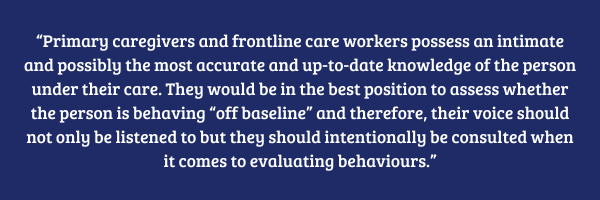Detecting delirium can be tough because it comes and goes, and conditions like dementia can make its symptoms harder to notice. However, when taking care of someone with dementia, early diagnosis and management of delirium is important. If left untreated, delirium could lead to a lasting decline in the person’s ability to think and their overall health.
The prevalence of delirium varies greatly from 1- 2% in the general community to as high as 35% and 70% in palliative care and those living in long-term care (LTC) facilities, respectively.1 Yet, a high percentage of delirium cases remain undetected, undiagnosed and therefore, untreated.
Among individuals with dementia, the risk of missing a diagnosis of delirium is even higher as delirium and dementia can present with similar manifestations (eg., confusion, disorientation, and agitation). Further, what makes the relationship between these two conditions complicated is their “bidirectional” effect on each other. Dementia is a risk factor for delirium; and, delirium can cause a further decline in cognitive function among those with dementia.
Delirium, however, is treatable. If this is the case, why the high percentage of undiagnosed delirium and what does untreated delirium mean for someone with dementia?
What is Delirium?
The Alzheimer’s Society of the UK defines delirium as “a common, serious, but often treatable condition that starts suddenly in someone who is unwell.”
Delirium is an acute condition, that is, it occurs suddenly, and usually lasts over a short period of time. Delirium constitutes a medical emergency. This means that the underlying cause of delirium (e.g., pain, dehydration, infection) requires immediate attention, clinical management, and treatment.
For an individual living with dementia, delirium may cause an irreversible decline in cognitive function, even after the delirium has been treated. For instance, someone who is able to ambulate (i.e., walk with or without support), dress themselves, and perform activities of daily living (ADL), can experience a functional decline or complete loss of prior abilities after a delirium episode.
Types and Signs of Delirium
The three main categories of delirium are hypoactive, hyperactive, and mixed-type delirium.
Hypoactive delirium usually manifests as an “unusual” or “off-baseline” level of sleepiness (i.e., more than usual) or being unable to stay awake when out of bed. Individuals can also present with drowsiness, lethargy, feeling unusually tired and quiet, and withdrawal from social activities.
Hyperactive delirium presents as extreme agitation (above baseline), aggressive behaviour, restlessness, and even delusions or hallucinations. For individuals with Lewy Body Dementia, this is even harder to diagnose as individuals with this type of dementia usually experience delusions and hallucinations as part of their dementia.
Finally, individuals experiencing mixed delirium show fluctuations in behaviour. They may switch between hypo- and hyper- active delirium. They can be quiet and lethargic at one time and then have episodes of agitation and aggression.
The symptoms of delirium can also be classified into cognitive and non-cognitive.
Cognitive symptoms include off-baseline changes to executive functioning, disorientation, and disturbances in an individual’s ability to focus or pay attention.
Non-cognitive symptoms of delirium, on the other hand, manifest as disturbances in a sleep-wake cycle; diminished or impaired psychomotor ability; impaired speech and language capabilities; and, delusional episodes and hallucinations.
When caring for someone with dementia exhibiting off-baseline behaviour, consider checking for delirium. As mentioned previously, delirium is a medical emergency and therefore, requires urgent medical attention – delirium is treatable once it’s discovered. Below is a mnemonic to help assess whether someone is experiencing a delirium episode.
PINCHME – “PINCHME” stands for Pain, Infection, Nutrition, Constipation, Hydration, Medication and Environment.2
Can Someone with Dementia Also Experience Delirium? The Consequences of Untreated Delirium
YES! When a person living with dementia is exhibiting agitation, uncooperative behaviour or even verbal and physical aggression, it is NOT always because of their dementia. Sadly, this misconception may probably be one of the main reasons why cases of delirium are left undiagnosed and untreated.
The urgency to diagnose and treat a preventable condition such as delirium, especially for someone with dementia cannot be emphasized enough.
Imagine an individual with dementia not being able to communicate that they are in pain, thirsty, experiencing discomfort because of untreated constipation and given psychoactive medication instead to manage the behaviour.
The use of psychoactive medications may mask the symptoms of delirium but does not treat the underlying condition. Worse, left untreated, delirium can cause a decline in the person’s health, and abilities, lead to hospitalization and in some cases, death.
Lastly, if someone you know is exhibiting signs of agitation, lethargy, confusion, or any of the symptoms mentioned in the previous sections, consider ruling out delirium first. This means consulting a health professional to check for possible causes of the behaviour (refer to PINCHME mnemonics above). If the symptoms disappear after treatment, then most likely, the person is experiencing delirium. It is important to clear the delirium first before evaluating someone for dementia.

Your Invaluable Role as Primary Caregiver and Frontline Care Worker
Primary caregivers and frontline care workers possess an intimate and possibly the most accurate and up-to-date knowledge of the person under their care. They would be in the best position to assess whether the person is behaving “off baseline” and therefore, their voice should not only be listened to but they should intentionally be consulted when it comes to evaluating behaviours. The changes may be subtle, but someone who has intimate knowledge of a person would most likely be able to tell the difference. Nursing staff and physicians are dependent on their input and feedback.
Caring for someone living with dementia requires paying attention to the person with dementia, as well as mutual cooperation, and open and honest communication among the members of their circle of care. Delirium is treatable and reversible and everyone should work together to prevent health deterioration and suffering of individuals who are not able to communicate for themselves. Everyone has an important role to play.
At Dementia Solutions, we’ve made it our mission to demystify dementia behaviour and continue to explore person-centred, creative, non-pharmacological solutions to manage dementia-related behaviours. We believe that awareness creation and skill-building through education is the most effective and powerful tool we have to promote and maintain the well-being of both the person with dementia and their caregiver. You may find this Meaning Behind the Behaviour Story helpful.
If you need support in your caregiving experience or would like to learn more about our educational opportunities, please reach out to us at Info@DementiaSolutions.ca and we would be more than happy to support you.
DISCLAIMER:
The contents of this blog are provided for information purposes only. They are not intended to replace clinical diagnosis or medical advice from a health professional.
REFERENCES:
2 – https://www.bgs.org.uk/resources/end-of-life-care-in-frailty-delirium



